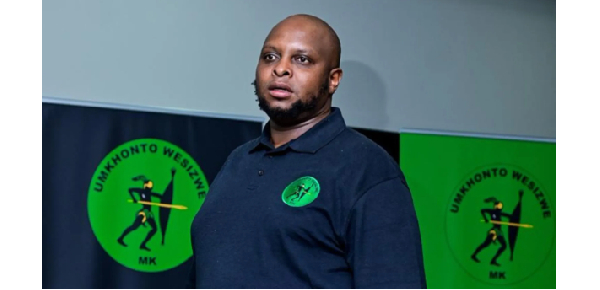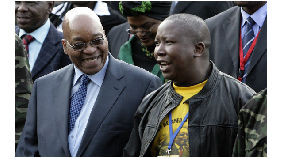A major player on South Africa's political landscape for more than a decade, the Economic Freedom Fighters (EFF) has been shaken to the core following the defection of its deputy leader Floyd Shivambu to former President Jacob Zuma's fledgling party - uMhkonto weSizwe (MK), or Spear of the Nation.
Mr Shivambu was seen as the EFF's ideological guru, while party leader Julius Malema assumed the mantle of commander-in-chief - or "screamer-in-chief", as his critics dubbed him - with his fiery rhetoric demanding the nationalisation of white-owned land and mines, and the "decolonisation" of education.
The duo seemed to be a winning team, with the EFF gaining the support of South Africa's burgeoning youth population frustrated with the slow pace of political and economic reforms since the end of the racist system of apartheid in 1994.
But the EFF suffered a major setback in the May general election when, instead of achieving its goal of rising from the country's third biggest party to second, it dropped to fourth.
MK proved to be its political nemesis - just as it was for the governing African National Congress (ANC) - by gaining votes from both parties to snatch third place in the first election it contested.
"MK cannibalised the ANC and took votes from the EFF. It changed the course of South African politics, making the ANC lose its parliamentary majority for the first time since 1994," William Gumede, an academic with Wits University's School of Governance in Johannesburg, told the BBC.
Mr Shivambu read the political tea leaves and defected to the MK last week, causing the biggest rupture in the EFF since its launch 11 years ago.
For Mr Malema, it was a personal blow because the two, as young men oozing with political energy, had jointly launched the EFF after the ANC - ironically then led by Mr Zuma - expelled them.
They had challenged the authority of a president who was steeped in traditional values of respect for elders, and were kicked out after accusations of being divisive and bringing the party into disrepute.
"The EFF took with it almost the entire youth wing of the ANC, and also came to dominate student politics at campuses across South Africa, such was the party's appeal amongst young people," said Paddy Harper, a journalist with South Africa's Mail & Guardian newspaper.
"Malema had the charisma to get support, and Shivambu the brains to give it ideological direction," he told the BBC.
"With their break-up, the EFF will enter a period of turmoil. This will be felt across South Africa, from campuses to parliament as the EFF tries to prevent losing more support to MK."
However, political analyst Moeletsi Mbeki said the break-up would actually "strengthen" Mr Malema's position in the EFF as he no longer faced a "potential threat" to his power.
"The EFF is considered as more of a cult, run by Malema. In such a system, the leader is the leader. Full stop. Anyone who appears to be close to the leader eventually becomes a casualty," he told the BBC.
The first public sign of the relationship running into trouble came last year, when Mr Malema paid a glowing tribute to Mr Shivambu, describing him as a thinker, before warning him not to plot against him.
"I’m ruthless against people who do such things to me, so never try that with me,” Mr Malema was quoted as saying at a gala dinner.
With Mr Malema set to run for re-election as party leader at the EFF's conference in October, Mr Shivambu, 41, appeared to have decided that it was time to move on.
MK has made him its national organiser - a demotion from his role in the EFF but still a senior post with the responsibility of growing the party.
But, Mr Harper said, it was unclear how he would get along with Mr Zuma, given their previous fall-out and the fact that the former president was also a cult-like figure in MK who repeatedly appoints and sacks officials. In less than a year the party has had three secretary generals.
"But there is also the view that the party is still finding its feet, and will stabilise with its core leadership including Zuma, John Hlophe, the impeached judge who has been made his deputy, and Shivambu," Mr Harper said.
Another reason which could have pushed Mr Shivambu to defect is that he and Mr Malema - despite their public personae of being socialists and African nationalists - were at the centre of a major corruption scandal, he added.
They have been accused of receiving about 16m rand ($9m; £7m) in "gratification" - bribes, in simple language - from the boss of a now-liquidated bank after meeting him at a penthouse in an upmarket suburb of Johannesburg in 2017.
The allegation was made in a recently leaked witness statement by the bank's disgraced boss, Tshifhiwa Matodzi, after he pleaded guilty to 33 counts of corruption, theft, fraud, money laundering and racketeering for being involved in what investigators described as a "bank heist".
Both Mr Shivambu and Mr Malema have denied any wrongdoing, but with a police investigation under way - and their political rivals likely to keep up the pressure - the scandal will not go away anytime soon.
"It is the biggest corruption scandal to hit the EFF, and if the party had to turn anyone into a sacrificial lamb it would have been Shivambu - certainly not Malema," Mr Harper said.
"So, his move to MK makes sense as it offers him more protection. It is a bigger party full of people accused of corruption - including Mr Zuma himself." The former president has denied any wrongdoing.
MK was also a natural political home for Mr Shivambu as its economic policy is similar to the EFF's - both advocating the expropriation of white-owned land and the state ownership of mines and banks - policies that were adopted by many
African states after their independence but which were abandoned around the time of the collapse of the Soviet Union more than 20 years ago.
"MK and EFF represent the old nationalist politics of Africa. They are totally out of touch," Mr Mbeki said.
"State-owned companies in South Africa are huge, but they are collapsing because of mismanagement. For the working class, it means a loss of jobs," he added.
Expressing a similar view, Prof Gumede said the EFF had failed to gain a foothold in South Africa's trade union movement despite being in existence for more than 10 years.
"Whether working class or middle class, older voters see the EFF as standing for chaos and confrontation. They want parties to co-operate to solve South Africa's problems because we have an electricity and water crisis, and high unemployment and crime," Prof Gumede said.
This was the clear message from the election, he added, but both the EFF and MK had made a "strategic mistake" by failing to join the government of national unity that President Cyril Ramaphosa formed after the election.
Mr Harper said that since the general election, MK had done badly in by-elections held in Mr Zuma's political backyard of KwaZulu-Natal.
"It is not in government, and all it has been doing is oppose the coalition government in the province. That is not what voters want. They want delivery of basic services," he said.
"As for the EFF, the ANC is currently in the process of dumping it as its coalition partner in cities such as Johannesburg. So it, too, is out in the cold.
"Logically, the EFF and MP should be strengthening relations to offer voters a viable alternative, rather than competing against each other for members and voters," Mr Harper added.

Economic Freedom Fighters deputy leader Floyd Shivambu
Africa News of Saturday, 24 August 2024
Source: bbc.com

















